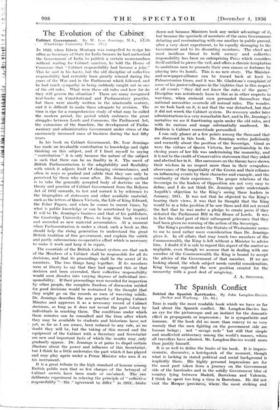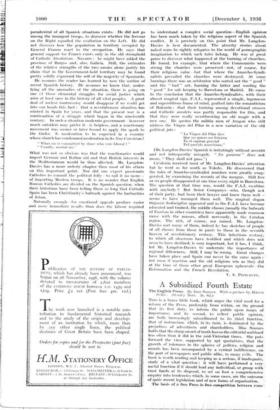The Spanish .. Conflict
Behind the Spanish Barricades. By John Langdon-Davies. (Seeker and Warburg. 12s. ed.) •
Tame is easily the most readable book which we have so far had about the Spanish conflict. Mr. Langdon-Davies has an eye for the picturesque and an instinct for the dramatic effect in propaganda or impression ; he is sympathetic and humane. If the book did no more than convey to us very warmly that the men fighting on the government side are human beings ; :not " siti.rage reds" but still that simple and unaffected aristocracy among the world's masses, whOm all travellers have admired, Mi. Langdon-Davies would more than justify himself.
It is as well to define the limits of his book. It is impres- sionistic, discursiVe, a hotchpotch of the moment, though what is lacking in stated political and social background is implicitly there. His highly personal impressions are for the most part taken from a journey on the Government side of the barricades and in the solidly Government bloc of country lying between Madrid, Barcelona and Valencia. I think he spent too long a time in Barcelona. He did not visit the Basque liniviticeii; *here-, fhe most striking and paradoxical of all Spanish situations -exists:. Be -did not go among the insurgent troops, to discover whether the fervour on the Right equalled the exaltation on the Left. He did. not discover how the • population in territory occupied by General Franco react to the occupation. - He says that general support for Franco exists only in the old stronghold of Catholic Absolutism—Navarre ; he might have added the province of Burgos and, also, Galicia. Still, the estimates of the relative strengths of the two armies alone justify his claim that in the "Government-held territory may be found pretty solidly expressed the will of the majority of Spaniards.
He assumes the reader has learned by now the outline of recent Spanish history. He assumes we know that, under- lying all the anomalies of the situation, there is going on one of those elemental struggles for social justice which arise at least once in the history of all vital peoples. A great deal of useless controversy would disappear if we could get into our heads this fact : that a revolutionary situation has existed in Spain for years, and that the present war is a continuation of a struggle which began in the nineteenth century. In such a situation moderate government—however Much outsiders may prefer it—is helpless, and a reactionary movement was sooner or later bound to apply the spark to the tinder. Is moderation to be expected in a country whose church has condemned moderation in its New Odechism ?
" What sin is committed by those who vote liberal 1" " Usually, mortal sin.-
What was not so obvious was that the reactionaries would import German and Italian aid and that British interests in the Mediterranean would be thus affected. Mr. Langdon- Davies has a more orderly chapter than most of his others on this important point. Nor did one expect passionate Catholics to commit the political folly—to call it no more— of importing Moslem troops. It is no wonder that English Roman Catholics are divided on the Spanish question, when their historians have been telling them so long that Catholic Spain has been Christianity's bulwark against the barbarities of Islam.
Naturally enough—for emotional appeals produce easier and more immediate results than does the labour required. to understand a complex social question—English opinion has been much taken by the religious aspect of the Spanish conflict. It is precisely on this point that Mr. Langdon- Davies is best documented. The atrocity stories about naked nuns he rightly relegates to the world of pornographic imagination to .which such tales belong.. He was at great pains to discover what happened at the burning of churches. He found, for example, that where the' Communists were strong the churches were preserved—not, of course, for their religious value—but that where the Anarcho-Syndi- calists prevailed the churches were destroyed. At some burnings there was an arbitrator who sorted out the " good " and the bad " art, burning the latter ,and sending the " good " for safe keeping to Barcelona or Madrid. He came to the conclusion that the Anarcho-Syndicalists, with their
almost magical sign, F.A.I., represented a simple, ingenuous and superstitious frame of mind, grafted into the romanticism of Bakunin ; that their training among devotional crosses and Catholic amulets was partly responsible for this, and that they were really overthrowing an old magic with a new one. He quotes the militia men of Aragon who still
address the Virgen del Pilar in a new variation of the old political jots :
" La Virgen del Pilar dice Que no quiero ser feixista Es el capitan general
Del partido anarchista."
(Mr. Langdon-Davies' Spanish is irritatingly without accents and not infrequently misspelt. " No pasaron" does not mean, " They shall not pass.")
Catalonia received most of Mr. Langdon-Davies' attention but he went as far south as Toledo. He discovered that the tales of Anarcho-syndicalist murders were greatly exag- gerated, by examining the records of the morgue. Still five or six people disappeared at one time every night in Barcelona. The question at that time was, would the F.A.I. combine with anybody ? But Senor Companys—who, though not
of their party, had been their lawyer and knew them well seems to have managed them well. The magical slogan Organise Indiscipline appeared and as the F.A.I. have become educated and trained, the middle classes (usually the bulwark of Fascism in other countries) have apparently made common • cause with the masses, albeit nervously, in the Catalan region. The rich, of course, are ruined. Mr. Langdon- Davies met many of them, indeed he has sketches of people of all classes from those in panic to those in the seventh heaven of revolutionary ecstasy. This infectious ecstasy, to which all observers have testified and which does not seem to have declined, is very important, but it has, I think, led Mr. Langdon-Davies to underrate the importance of regional differences. Still, I may be wrong. Great changes
have taken place and Spain can never be the same again ; ' not even if reaction and the old religions win as they did at the time of those other great European upheavals—the Reformation and the French Revolution.
V. S. PnErciterr.





















































 Previous page
Previous page